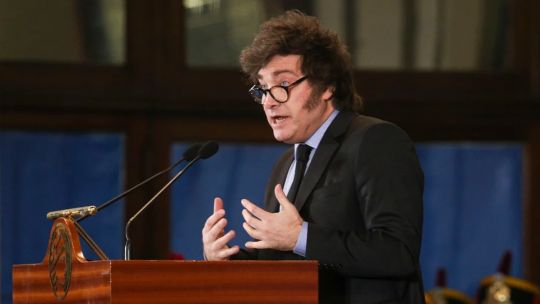
President Javier Milei on Thursday vowed to veto a push by Congress to significantly increase government spending on pensions and social security, measures he says threaten to derail his austerity drive before crunch October’s midterm elections.
The President’s fears of a pushback from angry provincial governors came to pass in the Senate on Thursday as the opposition took control of the agenda and pushed ahead with its own legislative plans.
Denouncing what he described as an “institutional coup,” Milei lashed out at critics in a speech at the Buenos Aires Stock Exchange on Thursday, just minutes after the opposition had passed bills against his wishes.
“In light of what happened today, I bet everyone knows what I’m going to do: we’re going to veto it,” the president remarked.
“We are going to veto it and if the veto is overturned, we will take legal action,” said the self-described “anarcho-capitalist” head of state.
Without mentioning them by name, Milei took aim at the governors: “Even if they stab you in the back, if you knew about it, you probably had a safety vest and nothing would happen. The knives exist, but the macro is a safety vest. We already knew yesterday what happened today.”
“The most important thing is that they are desperate, because in October, freedom will prevail,” he said, looking ahead to the midterm elections.
“As you can see, the policy of fiscal surplus is permanent,” he said.
Nevertheless, the Senate session will go down as a major blow for Milei.
In a spicy session, lawmakers in the upper chamber passed a bill increasing retirement benefits by 7.2 percent and raising a bonus payment for pensioners by 40,000 pesos to reach 110,000.
In addition, a bill extending a controversial pension moratorium was also passed – a snub to Milei who had warned previously he would veto any push to undermine fiscal balance.
The bill increasing pensions and the bonus was passed by 52 votes to four abstentions, with many senators absent. Votes in favour were cast by Peronists, Radicals and provincial parties, exceeding the necessary two-thirds majority.
Similarly, the pension moratorium was approved by 39 votes in favour, 14 against and one abstention.
Prior to the vote, Milei’s La Libertad Avanza (LLA) senators, most of the right-wing PRO party and several other provincial representatives had declared they would be absent as they do not recognise proceedings.
Milei has regularly said he would veto the pension bill, which to override would require two-thirds in both chambers of Congress. In June, the lower house Chamber of Deputies approved the bill with a much closer vote than in the Senate with 111 legislators in favour, 100 against and 15 abstentions.
Combined with other measures before the Senate, the government expects the additional expenditures could equal around 2.5 percent of gross domestic product. That impact would effectively erase the fiscal surplus from painful spending cuts over Milei’s first year and a half in power.
Both Milei and Economy Minister Luis Caputo spoke in interviews Wednesday, July 9, on Argentina’s Independence Day, warning the moves could generate market turmoil and jeopardise the disinflation process ahead of the midterms.
Argentines will vote for one-third of the Senate and half of the lower house Chamber of Deputies in October. While Milei’s party is expected to perform well, he is still expected to have to negotiate with allies to muscle through his economic reforms.
‘Destroy the government’
The President had certainly anticipated turbulence in the upper house. Midweek, he had lashed out at provincial governors in an interview, accusing them of wanting “to destroy the national government.”
“They want to destroy the national government because, deep down, what we are showing is that what has been done to the Argentine economy over the last 100 years is wrong and has generated huge business for the State Party,” the President claimed.
“Regardless of their political affiliation, they are all state parties. They care about power and their own interests, and this model proves that they are part of the problem and not the solution,” he told journalist Luis Majul.
In a speech to some of his closest collaborators on Independence Day, Milei called on his Cabinet to “dare to take up the cultural battle” and “defend the enormous work we have done.”
“Take charge. We are the best government in history, and we must defend this achievement everywhere,” he declared.
He went on to highlight the economic progress achieved by Chile under dictator Augusto Pinochet during his time in office, though he said that faltered as they had “not waged the cultural battle.”
Pinochet, who led Chile from 1973 to 1990, persecuted his political enemies and critics in a fierce clampdown while in office, leading to the execution of more an estimated 3,000 people, the internment of as many as 80,000 and the torture of tens of thousands more.
– TIMES/NA/PERFIL/BLOOMBERG





